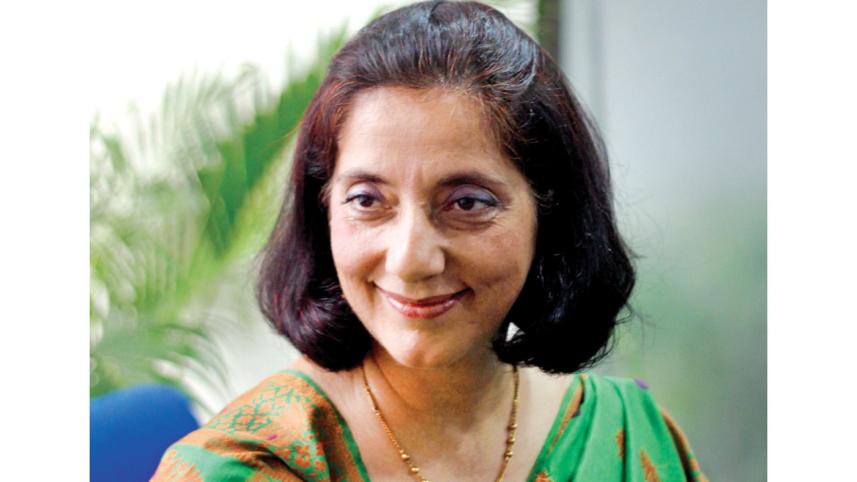"SMART CITY DOES NOT MEAN BEING TECHNOLOGICALLY ADVANCED; IT MEANS HAVING A CITY WHICH IS MORE INCLUSIVE AND LIVEABLE."

Photo: Kazi Tahsin Agaz Apurbo
"Politics matters and we need to constructively engage in politics,” believes Meera Sanyal, an Indian politician who ends her 30-year of banking career to focus more on public services and philanthropy that she is truly passionate about. Former CEO and chairman of the Royal Bank of Scotland, India, Meera Sanyal joined the Aam Aadmi Party and participated in the National Parliamentary Elections as the candidate for South Mumbai. Recently she was invited to deliver a speech to the students of the University of Liberal Arts Bangladesh (ULAB). The Star Weekend catches up with this inspiring woman to learn about her challenges, political agendas and much more.
How do you plan to help break the traditional political culture?
In India for many years politics has been regarded as an unpleasant domain. People have this common belief that only corrupt people and people with criminal background are going to be in politics. I am very hopeful that the scenario will be changing. Lots of people are seeing politics in a more constructive way. Since the challenges of our country are pretty huge, we need more professional domain expertise to come into politics. We need doctors, bankers and professionals from all walks of life to bring their knowledge into the political area so that the legislation that we form is better informed. Because after all when you are elected as a member of parliament your role is to frame policies that are contextual, effective and executable. So certainly from my experience I would bring my banking and corporate knowledge into my services. Having better informed citizens' participation in the politics is very important.
Considering the recent incidents of religious intolerance occurring in Bangladesh and India, how do you think that the incidents are detrimental to the economic growth of the countries?
I would like to answer it from a banker's perspective. In any country it's very important for people to feel safe, otherwise their ability to contribute to their work or any other investment will be affected. In both of these countries, any investment – be it foreign or local- is very important. If we have a law and order situation as such, it will have a direct impact on the country's economy. It is important that these situations should be tackled swiftly and effectively as per the law of the country.
While rarely would we find women in a leadership and a decision making role in our male dominating workforce, what were the biggest
challenges that you encountered to make your presence so prominent on the board?
I believe that when women are socially, financially and also politically empowered, it changes the dynamics of the family and it creates a great societal impact. In South Asia the number of women working in corporate sectors has increased, even though we hardly recognise their contribution and potential. It is also important that we create opportunities for women in leadership positions and for that having role models is very important. If you are a young banker or a lawyer for example, and if you see the successful women in the topmost positions, you will feel inspired. In India we have been very fortunate to have a generation of bankers who pierced the glass-ceilings. My own mentor, the woman I really look up to and always has been my inspiration is Tarjani Vakil, former chairperson of the Exim Bank in India. We also have a pool of talented women in the banking sectors, who have become role models for many young woman bankers. Each of us in our own small way has been trying to encourage other women working in our bank to opt for a leadership position. Similarly many successful women are working in the corporate sectors who are working as role models and creating opportunities for others.
You have always been quite vocal about women empowerment and women safety. Would you like to give us some more insight into your political agenda?
Apart from these two, another issue that is now taking a lot of my time is urban development and urban regeneration, especially in my constituency which is South Mumbai. We need to find a new paradigm where the mega cities like Mumbai, Delhi and even Dhaka become liveable. So I am spending a lot of time with the young architects and urban planners to try and understand how we can reinvent our cities. There have been lots of discussions on having smart cities. Smart does not mean being technologically advanced; it also means having a city which is more inclusive and liveable.
In recent years, the number of youth leadership organisations has increased rapidly. From your leadership experience and especially your active involvement with AIESEC, what advice would you give to them?
My experience of working with the youth organisation goes back to 1981 when I started working as a founder member of the AIESEC India. The experience gave me an access to a global network and helped me learn many important life lessons from different people. I would like to encourage everyone to participate in such activities, because it teaches you how to organise your life and build relationships with people. I believe this should be a part of their education.



 For all latest news, follow The Daily Star's Google News channel.
For all latest news, follow The Daily Star's Google News channel.
Comments